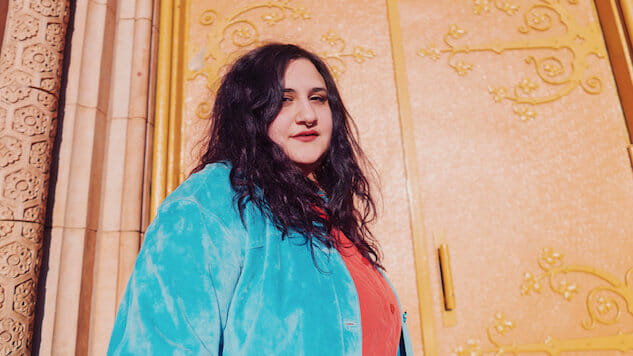Palehound Wrestle With Friendship, Change and Tattoos on Black Friday, Their Best Album Yet
Photo by Bao Ngo
Listening to Palehound is often like having a tough conversation with your best friend. There’s likely to be some pain, some old feelings dug up and picked apart, but you’ll always feel better after it’s over. And on the Boston-based band’s third LP Black Friday (out now on Polyvinyl), there are as many platonic heart-to-hearts and anxious tell-alls as there are romantic revelries and loving assurances.
Frontwoman and songwriter Ellen Kempner has always possessed an extraordinary understanding of the mechanics of relationships. Palehound’s first two albums, 2015’s Dry Food and 2017’s A Place I’ll Always Go, were both sharp examinations of intimacy and empathy, but regularly occupied Kempner’s own headspace. Black Friday finds her singing in second person more often than not, occasionally referring to a nameless “darling” who could easily be either a partner or a friend. She’s not only grappling with her own feelings, doubts and fears, but also those of others. Many of the lyrics go back to a single question for all involved: “Am I enough?” On “Worthy,” Kempner isn’t even sure she deserves her happy relationship, even though inside it, she’s accepted for exactly who she is. “I think I hate my body ‘till it’s next to yours,” she sings. “With you I’ll wear the clothes I’d buried in my drawers.” On the very next track, “Killer,” she fantasizes about killing her friends’ abusers. It’s dark for certain, but you get the feeling Kempner is the kind of friend who’d help you hide a dead body—that’s to say, a really, really good friend.
Black Friday started out as a jumble of demos partly written in a wrestling troupe’s practice space, but after a few weeks huddled in a Stinson Beach, Calif. studio—where Kempner says “the moon was out over the ocean, like completely, ridiculously beautiful outside the window”—with bandmates Jesse Weiss and Larz Brogan and producer Gabe Wax, Palehound’s LP emerged as this collection of tender and fierce songs sung to the sound of affecting soft rock with a DIY edge.
A few weeks before the record’s release Kempner called Paste from New York City, where she’s still planning to move in the fall, even after “a huge rat” scuttled by her café seat right in the middle of this chat. We talked about bodies, friendship and the instability of the music business, among other things. This conversation has been edited for length.
Paste: What was your mindset going into LP3?
Ellen Kempner: I had just come off a bunch of touring, and we toured with some really amazing acts, so I was feeling really inspired. And I was thinking a lot about bodies, which sounds really weird. I mean, I was really hyper aware of my own body, and I was just feeling inspired to write. And the thing that was most on my mind was my relationship to my body and the relationships I’ve noticed people having with their bodies and how destructive that can be and how beautiful it can be.
Has your relationship to your body changed over the past few years?
You know, it’s been a ride. I guess I’m kind of like a bigger person. I’m kind of fat, and after a year of touring, I was feeling a little discouraged about it because there are not very many other big people in indie rock, especially not big women. And so even after feeling inspired and being on the road and even after a lot of really cool shows, I was still feeling very hyper aware of myself and wondering if my body and the way I look was holding me back as an artist and as a performer and just having a lot of really negative thoughts and deciding that I really wanted to work through those.
Why did you guys decide to track the majority of these songs live?
For this record, I was renting a practice space that I was sharing with a wrestling troupe, which was really cool. So it was this windowless room that was also filled with wrestling posters and maps in one corner and my drums and amps in one corner. And so it was a funny place to be writing. But I demoed out all those songs just so I could have an idea of what I wanted things to sound like going into the recording process. Because of all the touring we’d done and how close we’d been—me and Jesse [Weiss], my drummer and Larz [Brogan], my bassist—I decided that it would be really cool to track an album live and have us all go out to Stinson Beach in California, which was, like, the ultimate privilege and the ultimate experience. I wanted my friends to come too, and I wanted us to really capture what playing live feels like instead of just overdubbing a bunch of stuff.
Did you ever cross paths with the troupe?
-

-

-

-

-

-

-

-

-

-

-

-

-

-

-

-

-

-

-

-

-

-

-

-

-

-

-

-

-

-

-

-

-

-

-

-

-

-

-

-








































